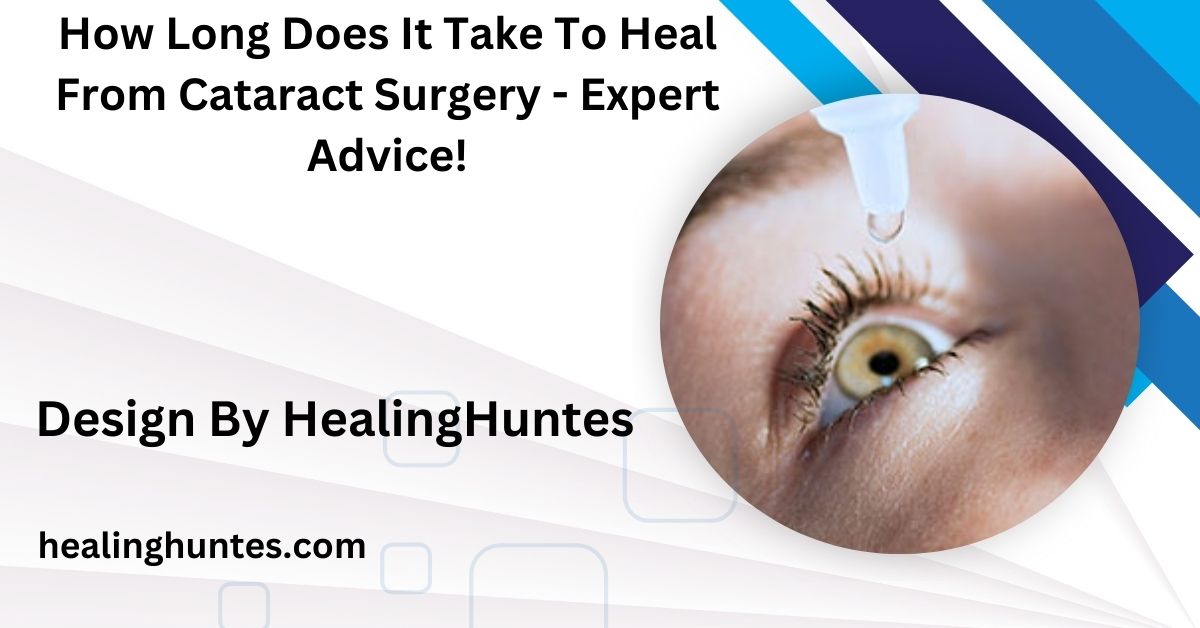How Long Does It Take To Heal From Cataract Surgery – Expert Advice!
It typically takes about 4 to 6 weeks to fully heal from cataract surgery, although many patients experience improved vision within a few days.
In this article, we will provide a comprehensive guide to help you understand the healing process after cataract surgery, what factors influence recovery time, and how you can speed up your recovery.
What Is Cataract Surgery:

Cataract surgery involves the removal of a cloudy lens in the eye, which is replaced with an artificial intraocular lens (IOL). The procedure is typically performed under local anesthesia, and it is relatively quick, often taking less than 30 minutes.The goal of cataract surgery is to improve vision that has been impaired by the clouding of the natural lens, a condition known as cataracts.
How Long Does It Take to Heal from Cataract Surgery:
Generally, it takes about 4 to 6 weeks to fully recover from cataract surgery. However, your recovery time will depend on various factors, including your overall health, the type of surgery performed, and your adherence to post-operative care instructions. Most patients begin to see improvements in their vision within a few days after the surgery, but it may take several weeks for your vision to stabilize fully.
Immediate Post-Surgery Recovery:
Right after cataract surgery, patients are usually advised to rest for a few hours while the anesthesia wears off. You may experience mild discomfort, blurry vision, or slight irritation in the first few days. These symptoms are common and typically resolve on their own as the healing process progresses.During the first 24 to 48 hours, it’s important to follow your doctor’s instructions closely.
Also Read: Should I Let Them Heal Doing Exercise – Recovery Exercise Tips!
Week 1 to Week 2: Early Healing
By the end of the first week, most people experience a noticeable improvement in their vision. Although you might still experience mild discomfort or a feeling of grittiness in the eye, these symptoms should be temporary. It’s also common to experience some fluctuations in vision, including blurry spots or glare. These issues typically subside as the eye continues to heal.During this period, it’s important to avoid any strenuous activities, especially those that involve bending over or lifting heavy objects.
Week 2 to Week 4: Continued Healing
During the second and third weeks, your vision will continue to improve, and most people will experience much clearer vision by the end of the first month. You may still notice some dryness or irritation, which can usually be managed with prescribed lubricating eye drops.At this stage, you can resume most of your normal activities, including light exercises.
Week 4 to Week 6: Full Recovery
By the time you reach 4 to 6 weeks after your surgery, your eye should be mostly healed, and your vision should be stable. However, follow-up appointments with your ophthalmologist are necessary to ensure that the eye is healing correctly. These visits allow your doctor to monitor your recovery and address any concerns that may arise.
Factors That Affect Healing Time:

Several factors can affect healing time after cataract surgery, including age, overall health, the presence of other eye conditions, and adherence to post-surgery care instructions. Younger, healthier patients may heal faster, while individuals with diabetes or other health concerns may experience a longer recovery. Proper rest, medication, and follow-up visits also play crucial roles in a smooth recovery process.
Age and Overall Health:
Older individuals or those with chronic health conditions like diabetes may experience a longer recovery period. It’s important to manage these conditions well during the healing process, as they can impact eye health and the recovery process.
Type of Cataract Surgery:
There are two primary types of cataract surgery: traditional and laser-assisted. While both are effective, laser-assisted surgery may result in a slightly faster recovery time, as it can be more precise and cause less trauma to the eye.
Post-Operative Care:
Following your doctor’s instructions after surgery is crucial to a smooth recovery. This includes using prescribed eye drops, attending follow-up appointments, and avoiding activities that could strain your eye, such as heavy lifting, bending, or excessive screen time.
Also Read: Signs A Broken Bone Is Not Healing – Key Indicators!
The Presence of Other Eye Conditions:
If you have other eye conditions such as glaucoma or macular degeneration, your recovery may take longer. It’s essential to address any existing eye conditions with your doctor before undergoing cataract surgery to ensure the best possible outcome.
Tips to Speed Up the Healing Process:
To speed up healing after cataract surgery, follow your doctor’s post-operative care instructions diligently, including using prescribed eye drops to prevent infection. Avoid straining your eyes by limiting activities like reading, screen time, or heavy lifting in the first few days. Protect your eyes from dust, bright lights, and water to minimize irritation and promote faster healing.
- Follow Instructions Carefully: Ensure that you are following your doctor’s advice on eye drop use, medication, and lifestyle changes.
- Rest Your Eyes: Avoid eye strain by limiting screen time and giving your eyes time to rest.
- Wear Protective Eyewear: Use sunglasses to protect your eyes from bright lights, UV rays, and dust.
- Avoid Water Exposure: Refrain from swimming or submerging your eyes in water during the first few weeks after surgery.
- Keep Your Follow-up Appointments: Regular check-ups with your ophthalmologist are essential to monitor your recovery progress.
FAQ’s
1. How long does it take to heal from cataract surgery?
It typically takes about 4 to 6 weeks to fully heal from cataract surgery, though many patients experience improved vision within a few days.
2. When can I drive after cataract surgery?
Most patients can resume driving within a few days to a week, depending on how well their vision improves and if their doctor clears them.
3. Is it normal to have blurry vision after cataract surgery?
Some blurriness is normal in the first few weeks as the eye continues to heal. If the blurriness persists after 6 weeks, consult your doctor.
4. What activities should I avoid during recovery?
Avoid strenuous physical activities, heavy lifting, swimming, and activities that may expose the eyes to infection or trauma.
5. Can I wear makeup after cataract surgery?
It’s best to avoid wearing makeup around the eyes during the first few weeks of recovery to prevent infection.
Conclusion
How long does it take to heal from cataract surgery can vary based on individual factors like overall health and adherence to post-surgery instructions. Most people recover in 4 to 6 weeks, with significant improvement in vision occurring in the first few days. By following your doctor’s guidelines and attending follow-up appointments, you can ensure a smooth and successful recovery process.






